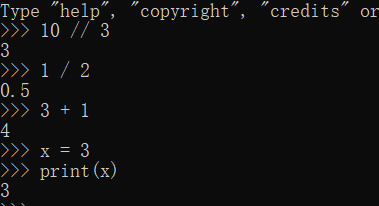python笔记:第一章基础知识
利用python交互式应用
搜索找到py即可

或是在终端运行python

1.概述
- python是个面向对象的脚本语言
- 与工业语言不同,每行无需分号,无需大括号
- 使用的是
Unicode编码来表示文本
运算符在python中同样成立

1.1变量
同样地,变量的命名只能由字母,数字和下划线构成。不能以数字开头。
- 在使用python变量前,必须要赋值,因为python中的变量没有默认值
1.2 语句
语句和表达式
1.3 获取用户输入
>>> input("your name is ")
your name is bob
'bob'
x = input()
y = input()
print(x * y)
// 会报错
Traceback (most recent call last):
File "d:\M\github\Python\Demo\t1.py", line 3, in <module>
print(x * y)
~~^~~
TypeError: can't multiply sequence by non-int of type 'str'
说明接受用户输入的是字符串类型str
x = input()
y = input()
print(int(x) * int(y)) // 转为int型
1
2
2
1.4 函数
-
分为内置函数和自定义函数
-
进行幂运算的函数
print(2 ** 3) 8 // 或是使用函数pow pow(2, 3) 8 -
abs计算绝对值
print(abs(-10)) 10 -
round 化整函数
// 将浮点数化整为最接近的整数 print(round(1.2)) print(round(1.5)) print(round(1.9)) 1 2 2
1.5 模块
模块,也称扩展,可以扩展python功能 关键字 import
使用方法:模块名.方法名
import math
math.floor(32.9) # 向下取整
32
math.ceil(32.9) # 向上取整
33
精确地导入某个函数
from math import sqrt
print(sqrt(9)) # 无需模块名 计算平方根
3.0



 浙公网安备 33010602011771号
浙公网安备 33010602011771号